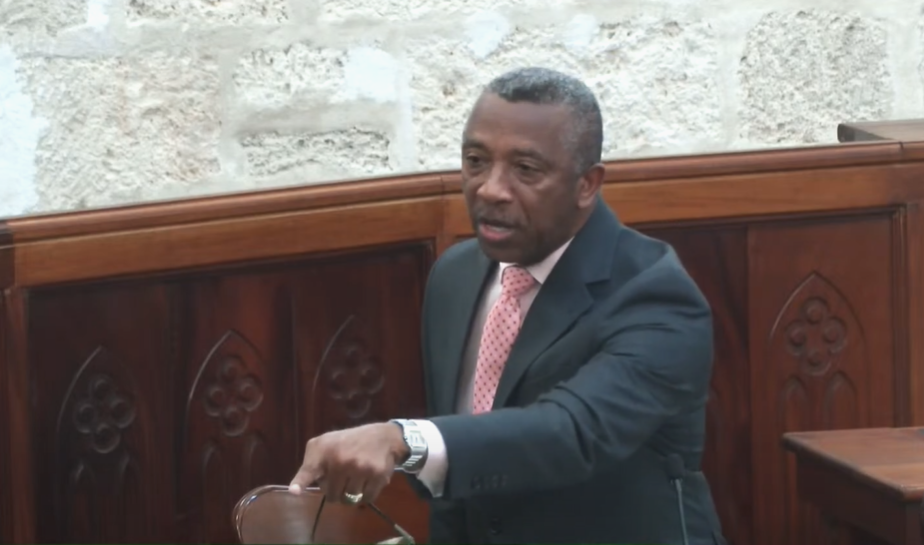Lack of Support for Fishing Industry Sparks Debate in Parliament Over Government Assistance Post-Hurricane Beryl

October 23, 2024
Opposition Leader criticizes government for inadequate support to fishing industry post-Hurricane Beryl. Government defends aid efforts, citing assistance to fisherfolk and upcoming financial support. Debate over insufficiency of boat repair initiative.
Opposition Leader Ralph Thorne lambasted the government on Tuesday for what he said was a lack of support for the fishing industry, accusing the administration of offering inadequate aid to fisherfolk still struggling to recover from the devastation caused by Hurricane Beryl.
But government MPs defended the administration’s efforts, indicating that affected fisherfolk had received assistance and millions of dollars more were coming their way.
During debate on the Merchant Shipping Bill 2024 in the House of Assembly, Thorne charged that the government’s initiative to cover 25 per cent of new boats or repairs was insufficient to help thousands left unemployed due to the extensive damage to vessels. The fishing industry suffered significant damage on July 1 as storm surges caused by Category 5 Hurricane Beryl ripped through vessels docked at the Bridgetown Fishing Complex.
Thorne argued that while the administration was focusing on modernising maritime legislation for large vessels, the fishing industry remained on “life support”.
“They [fisherfolk] believe that the offer of 25 per cent for a boat that will cost up to $470 000 is a contemptuous offer,” Thorne said. “That’s how they feel. They feel that this government, while being concerned with lofty matters of maritime shipping, merchant shipping [and] tourist liners… while this government is preoccupied with glamour and large business, they feel that this same government has little concern for the man from Oistins and Consett Bay, and Weston; they feel that their interest is not being looked after.”
The opposition leader charged that the government’s actions thus far showed its indifference to the true plight of the fishing industry, given the focus on legislation covering large maritime vessels and similar works.
He said: “I want this government to come down to low levels; I want this government to come down to small works; I want this government to make an offer to the fishing industry that is acceptable.
“They have been asking the government: ‘If I lost my boat, where am I going to get this [25 per cent]?’ This government must come to the fishing industry with a serious offer to save the industry.”
But Blue Economy Minister Adrian Forde firmly defended the government’s handling of the situation, highlighting that although the fishing industry lacks a formal employment structure – since many workers do not have National Insurance numbers or other essential documentation—the government has taken significant steps to offer support. This includes providing financial assistance through a business interruption benefit scheme.
“[The] decision from Cabinet is that we would pay for all boat owners for the first three months, initially, with the likelihood of extension. All boat owners will receive $2 500, and all crew members $1 500, and captains $1 500,” he said.
Forde further reported that 469 persons qualified under the business interruption benefit scheme and all of them received the first payment.
“For the second tranche, 150 persons have been paid thus far. These payments are given on a daily basis, so I expect between this week and next week that the other tranche would be delivered to those fisherfolk,” Forde explained.
Minister of Foreign Affairs and Foreign Trade Kerrie Symmonds also told his colleagues in the Lower House of Parliament that Prime Minister Mia Mottley is working on an arrangement with the World Bank to provide assistance for the local fishing industry.
He said this will go towards repairing and replacing fishing vessels impacted by Beryl and establishing a US$10.55 million (BDS$21.1 million) compensatory mechanism for fisherfolk.
Meanwhile, Thorne had also questioned the government’s decision to send a delegation to Canada after the storm to inspect boats for local use, suggesting that such assessments could have been conducted remotely, saving costs.
But Forde rejected the suggestion. He said it was fisherfolk who requested the trip. As a result, a delegation, including all necessary individuals, was sent.
He explained: “This government made a decision to allow and accommodate those fishermen.”
Forde said the delegation that went to Canada “to see the boats for themselves so that they can make informed decisions” included the permanent secretary in the ministry, the chief financial officer, a government procurement officer, a senior vessel inspector, four fisherfolk, and a local boat builder.
He said not only did the team go to ensure the boats were fit for purpose, but a government procurement officer was included “so that the procurement rules would be [followed]”. (SB)


